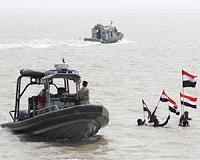 |
Washington (AFP) Sept 28, 2010 President Barack Obama's pointman on restoring the oil spill-hit Gulf coast recommended Tuesday that the area's recovery by funded in part by fines levied against BP, which could run to the billions of dollars. The report presented by Navy Secretary Ray Mabus seeks to dedicate a portion of "any obtained Clean Water Act civil penalties directly to the Gulf states," in a bid to secure a stable channel of funds to finance their recovery. Mabus, tasked by Obama in June to create a plan to restore the region, also urged the US Congress to create a Gulf Coast Recovery Council to oversee the funds. Under current law, BP faces fines ranging from 1,100 dollars per barrel spilled to as high as 4,300 dollars per barrel spilled, if negligence is proven. That means the British-based energy giant could face penalties of up to 17.6 billion dollars for the 4.1 million barrels that gushed into the Gulf. Mabus's recommendations drew praise from Louisiana Senator Mary Landrieu, whose state was heavily affected by the spill and has called for at least 80 percent of BP's fine payments to go toward a recovery fund. She told the investigating panel she was "thrilled" by Mabus's report and that Louisiana and the entire Gulf region were in dire need of a "dedicated and robust stream of revenue" to finance recovery efforts. In a statement, Obama also praised Mabus's report, saying it provided a "commonsense proposal for a path forward." "My administration is committed to working with the people of the Gulf to help them restore the ecosystems that support them, rebuild their livelihoods and safeguard their health and safety." Some 205 million gallons of oil flowed into the Gulf after the April 20 explosion aboard the BP-leased Deepwater Horizon oil rig, impacting the crucial fishing and tourism industries and destroying hundreds of miles of the region's fragile coastal ecosystems. "The effects of the oil spill may reverberate in the region and across the country for years to come," warned Mabus. About one third of the seafood harvested in the continental United States comes from the Gulf, which also produces some 30 percent of America's oil and 13 percent of its natural gas. "America needs the Gulf. America needs the Gulf to be clean. America needs the Gulf to be healthy," he said. Mabus said Obama will create an interim Gulf Coast Ecosystem Restoration Task Force, headed by Environmental Protection Agency Administrator Lisa Jackson, to immediately begin coordinating the region's recovery. The body would be dissolved or modified after Congress creates a new Recovery Council, he said. Mark Tercek, head of non-profit group Nature Conservancy, told the panel in testimony Tuesday that his organization "strongly supports" Mabus's report. The largest maritime oil spill in history "has refocused the nation's attention on one of the most important and productive ecosystems on Earth," Tercek said, adding that while "the full impact of the spill will not be known for some time, we can start recovery now with dedicated investment." Earlier, commission co-chair Bob Graham, a former Florida senator, urged lawmakers to tackle lax safety protections on other drilling operations further offshore. "It's clear the move to deep water represents an enormous change in the US energy exploration," Graham said. "Unfortunately our government and industry did not undergo a similar transformation in its regulatory, safety and response focus." In 1990, wells drilled at more than 1,000 feet accounted for four percent of the Gulf of Mexico's oil production. By 2009 that figure had soared to 80 percent, he noted. In the past five years the number of ultra-deep wells -- more than 5000 feet -- climbed from one percent to 32 percent. Describing policy failures that reached back decades across both Democrat and Republican administrations, Graham urged better regulation of deep water drilling technology. "We need such a change," he said. BP said earlier this month it has spent 9.5 billion dollars on the oil spill so far. The group has forecast that the environmental catastrophe will cost a total of about 32.2 billion dollars, after pushing it into a record 16.9-billion-dollar loss in the second quarter of the year. BP is also funding a 20-billion-dollar account which began paying out in August amid worries from potential claimants who fear they will not be adequately compensated.
Share This Article With Planet Earth
Related Links Powering The World in the 21st Century at Energy-Daily.com
 Iraq builds up navy with key mission -- to protect its oil
Iraq builds up navy with key mission -- to protect its oilUmm Qasr, Iraq (AFP) Sept 27, 2010 A new US-built patrol ship is the latest phase in a naval build-up by Iraq that has one key mission in mind - protecting the oil terminals that are the government's main source of revenue. For now, while Iraq's fledgling fleet is charged with key facets of defence at the two Gulf terminals through which 80 percent of its crude exports flow, foreign forces still retain ultimate responsibilit ... read more |
|
| The content herein, unless otherwise known to be public domain, are Copyright 1995-2010 - SpaceDaily. AFP and UPI Wire Stories are copyright Agence France-Presse and United Press International. ESA Portal Reports are copyright European Space Agency. All NASA sourced material is public domain. Additional copyrights may apply in whole or part to other bona fide parties. Advertising does not imply endorsement,agreement or approval of any opinions, statements or information provided by SpaceDaily on any Web page published or hosted by SpaceDaily. Privacy Statement |